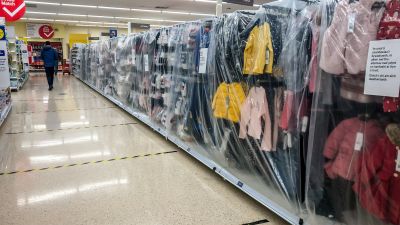Welsh Government updates list of items that can be sold in supermarkets following controversy during firebreak

The Welsh Government has announced a list of items that supermarkets in Wales will be told that they can sell during the 17 day firebreak lockdown.
It says it has provided retailers with an “updated list of goods” that can be sold during the country’s two-week firebreak lockdown.
A spokesman said that the Government had also “clarified that a sensible system should be introduced” in which customers can ask to buy non-essential items by exception under the regulations.
It also said that "it is for retailers to determine the system that is appropriate to their individual requirements.”
"Following positive discussions with essential retailers, representative groups and Trades Unions we have provided an updated list of goods that can be sold, and have clarified that a sensible system should be introduced whereby customers can ask to buy non-essential items by exception under the regulations.
“We are hopeful this provides a workable solution for retailers and customers. However, we cannot move away from the central principle that retailers must restrict the sale of non-essential goods for the duration of the firebreak.''
"We continue to work closely with the sector and would stress that these restrictions are in place to stop the spread of coronavirus and save lives. We are asking the public to continue to support the effort by restricting unnecessary journeys and shopping .”
However, the union for shop workers had hoped for more to be done to take the ''onus off shop workers.'' Jane Jones, from USDAW, said shop workers face the brunt of customers frustrations.
What can you buy under the new restrictions?
Food and drink
Products ancillary to the sale of food and drink, primarily disposable items used for the preparation and storage of food (such as kitchen foil, food bags and cling film) but also basic products necessary to prepare and eat food and drink
Products for washing clothes and for cleaning and maintaining the home, including batteries, light bulbs and fuel
Toiletries and cosmetic products, including toilet rolls and sanitary products
Pharmaceutical products
Baby products including equipment, clothes and nappies
Newspapers and magazines
Stationery and greetings cards
Pet food and other pet supplies
Products for the maintenance of bicycles and cars
How did we get here?
The 'Fire-break' restrictions in Wales, which began at 6pm on Friday and will end on November 9, meaning non-essential retail including clothes shops, furniture stores and car dealerships must close.
Shops selling multiple types of products have been able stay open but can only sell essential items - which according to the Welsh Government's website also includes those "which would normally be sold in pharmacies and chemists".
The ban on supermarkets selling non-essential items proved controversial with more than 60,000 people signing a petition calling for it to be immediately reversed.
On Monday Tesco was forced to apologise for wrongly suggesting sanitary products were "non-essential" and so could not be sold due to the new measures in place in Wales.
Replying to a customer who complained she had been told she could not buy sanitary pads at a store in the St Mellons area of Cardiff, Tesco said: "We have been told by the Welsh Government not to sell these items for the duration of the firebreak lockdown."
The supermarket later said the tweet was sent "by mistake" and said the relevant aisles had been closed off after a break-in at the store.
Speaking at the Welsh Government press conference on Monday, Vaughan Gething said Minister would ensure retailers understand what can and cannot be sold during the 17-day firebreak, but also discussed how shoppers with "exceptional circumstances" can purchase non-essential items.
The Health Minister said he recognised the ban on selling non-essential items was "difficult" and "hard for people to accept".
Welsh Conservative health spokesman Andrew RT Davies said the confusion was the result of a "barmy ban" by the Welsh Labour Government which should be stopped.
Adam Price, leader of Plaid Cymru, said public trust has been "eroded" over communication of the Welsh Government's ban on supermarkets selling non-essential items during Wales' firebreak lockdown.
"The important thing for the Welsh Government to acknowledge is that they have made a complete mess of the messaging," Mr Price said.
"Humility is important in admitting that you have got it wrong. They should have focused very clearly and very simply on the public health message."
Retailers made their own recommendations to the Welsh Government on Tuesday calling for customers to be "trusted to make their own decision" about whether an item is essential or not.
They said it would allow for "individual discretion" and "resolve the confusion over non-essential items."